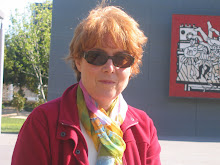Session three
Another interesting session!
I had doubts about whether I had the time available to be involved in this project. Now after three weeks I am very pleased I signed up.
Already I have learned so much.
So far I have:
- Acquired two pieces of equipment to help a colleague with her project- an eeepc and a digital photo frame
- Set up this blog
- Reviewed eportfolios and discovered the difference between blogs and eportfolios
- Found out the advantages and challenges of podcasts versus streaming video from the institute server (I had planned to make podcasts but think I will start with streaming video)
- Considered privacy issues with material held on the net - and thought about what is the best platform for me to use for my reflections - will continue with this blog but I am also using onenote in office 2007 - since it connects with my PDA and has good screen capture and live links - not so good for photos or videos - but they do not form a big part of my reflections as yet. I am interested in the levels of privacy eportfolios can provide
- Set up delicious (query spelling) and google bookmarks so I can access them from any computer
- Started to collect material for my first video
- Started to plan for videos 2 & 3
- Applied to have the smartboard software on my work computer - and next step my laptop - I am looking forward to creating interesting and interactive material for my classes next semester
- Set up training for my colleagues on the use of the smartboard - trying to get them enthusiastic so we can apply for funding to have them in two more classrooms
- Checked out other's blogs and posted comments
- Requested purchase of a digital recorder to assist in this project
- Found out how to play videos full screen from the server
- Answered one of my questions from the first session - how much can we trust digital information? - not much - it is so easy to edit and change
We have been encouraged to use a three step reflective process (Bronwyn Hegarty 2007):
- Step 1: Take notice & describe the experience
- Step 2: Analyse the experience
- Step 3: Take Action
So what did I notice this afternoon? That creating digital material to support student learning is both interesting and time consuming. I enjoyed playing with the apple mac computer and seeing the seamless ease with which it can help with creating and editing sounds, images and movies. I can't wait to play. If I had not bought a new laptop at the beginning of this year I would have gone for a Mac.
Analysis: The Mac makes creating these digital materials more achievable without huge amounts of technical support - I will be able to do it myself (I think)
Action:
- plan my first video - What is it going to be about? Who exactly is the audience? What do they want to know/learn? what is the best way of getting this message across? how can I make it interesting and engaging? beginning, middle and end?
- make the sound recordings for the introduction and voice overs etc
- Collect sound effects
- video my own material to set the scene
Also:
- Check out teacher tube for useful videos
- Download Audacity software to PC to record and edit sounds
- Try out mac laptop for imovies and garageband



